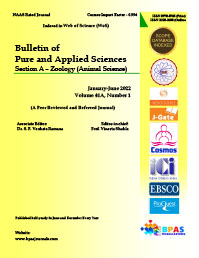Rapid Identification of Clinical Isolates of Klebsiella pneumoniae using MALDI-TOF MS from North India
DOI:
https://doi.org/10.48165/Keywords:
Klebsiella pneumoniae, Multi-drug resistance, MALDI-TOF MS, Antibiotic susceptibility testingAbstract
Infections caused by multi-drug resistant (MDR) Klebsiella pneumoniae are increasing day by day. K. pneumoniae poses a severe public health concern and causes wide array of healthcare associated infections with limited treatment options. The quick detection of these isolates is of prime importance for the adoption of proper antibiotic treatment and control measures. Also the mis identification using standard lab-based methods is quite common and hence, the clinical significance of K. pneumoniae complex members is inaccurately defined. Here, authors evaluated the potential of MALDI-TOF (Matrix-Assisted Laser Desorption Ionization-Time of Flight) MS (Mass Spectrometry) to discriminate and quick identification K. pneumoniae complex members. Thus, this study aimed at full MALDI-based approach to rapidly detect the K. pneumoniae isolates up to species level. We also explored the antibiotic resistance profile of K. pneumonia isolates using CLSI (Clinical and Laboratory Standards Institute) guidelines. These results demonstrate the potential of MALDI-TOF MS for precise identification of K. pneumoniae complex members and could be effectively utilized in the routine diagnostic microbiology laboratories.
Downloads
References
Angeletti S (2017). Matrix assisted laser desorption time of flight mass spectrometry (MALDI TOF MS) in clinical microbiology. J Microbiol Methods 138: 20–29.
Barnini S, Ghelardi E, Brucculeri V, Morici P and Lupetti A (2015). Rapid and reliable identification of Gram-negative bacteria and Gram-positive cocci by deposition of bacteria harvested from blood cultures onto the MALDI-TOF plate. BMC Microbiol 15: 124.
Cheesbrough M (1989). Medical laboratory manual for tropical countries. Cambridge, Great Britain, II (Microbiol) pp. 248-263.
CLSI (2006). Clinical and Laboratory Standards Institute (CLSI): Performance standard for antimicrobial susceptibility testing. 16th Inf Suppl CLSI Doc. M100–S16.
El-Bouri K, Johnston S, Rees E, Thomas I, Bome-Mannathoko N, Jones C, Reid M, Ben-Ismaeil B, Davies AR, Harris LG and Mack D (2012). Comparison of bacterial identification by MALDI-TOF mass spectrometry and conventional diagnostic microbiology methods: Agreement, speed and cost implications. Br J Biomed Sci 69(2): 47–55.
Fiori B, D'Inzeo T, Giaquinto A, Menchinelli G, Liotti FM, de Maio F, De Angelis G, Quaranta G, Nagel D, Tumbarello M, Posteraro B, Sanguinetti M and Spanu T (2016). Optimized use of the MALDI BioTyper system and the FilmArray BCID panel for direct identification of microbial pathogens from positive blood cultures. J Clin Microbiol 54(3): 576–584.
Friedlaender C (1882). About the Schizomycetes in acute fibrous pneumonia. Arch Pathol
Anat Physiol Clinic Med 87(2): https://doi.org/doi: 10.1007 / bf01880516
Idelevich EA, Sparbier K, Kostrzewa M and Becker K (2018). Rapid detection of antibiotic resistance by MALDI-TOF mass spectrometry using a novel direct-on-target microdroplet growth assay. Clin Microbiol Infect 24(7): 738–743.
Jain A and Mondal R (2007). Prevalence and antimicrobial resistance pattern of extended spectrum beta-lactamase producing Klebsiella spp isolated from cases of neonatal septicaemia. Indian J Med Res 125(1): 89–94.
Kumar A, Roberts D, Wood KE, Light B, Parrillo JE, Sharma S, Suppes R, Feinstein D, Zanotti S, Taiberg L, Gurka D and Cheang M (2006). Duration of hypotension before initiation of effective antimicrobial therapy is the critical determinant of survival in human septic shock. Crit Care Med 34(6): 1589–1596.
Li B, Zhao Y, Liu C, Chen Z and Zhou D (2014). Molecular pathogenesis of Klebsiella pneumoniae. Future Microbiol 9(9): 1071–1081.
Nordmann P (2014). Carbapenemase-producing Enterobacteriaceae: overview of a major public health challenge. Med Mal Infect 44(2): 51–56.
Nordmann P, Dortet L and Poirel L (2012). Carbapenem resistance in Enterobacteriaceae: here is the storm. Trends Mol Med 18(5): 263–272.
Nordmann P, Gniadkowski M, Giske CG, Poirel L, Woodford N and Miriagou V (2012). Identification and screening of carbapenemase-producing Enterobacteriaceae. Clin Microbiol Infect 18(5): 432–438.
Roca I, Akova M, Baquero F, Carlet J, Cavaleri M, Coenen S, Cohen J, Findlay D, Gyssens I, Heuer OE, Kahlmeter G, Kruse H, Laxminarayan R, Liebana E, Lopez-Cerero L, MacGowan A, Martins M, Rodriguez-Bano J, Rolain JM, Segovia C, Sigauque B, Tacconelli E, Wellington E and Vila J (2015). The global threat of antimicrobial resistance: science for intervention. New Microbes New Infect 6: 22–29.
Singhal N, Kumar M, Kanaujia PK and Virdi JS (2015). MALDI-TOF mass spectrometry: an emerging technology for microbial identification and diagnosis. Front Microbiol 6: 791. https://doi.org/10.3389/fmicb.2015.00791
Smiljanic M, Kaase M, Ahmad-Nejad P and Ghebremedhin B (2017). Comparison of in-house and commercial real time-PCR based carbapenemase gene detection methods in Enterobacteriaceae and non-fermenting gram-negative bacterial isolates. Ann Clin Microbiol Antimicrob, 16(1): 48. https://doi.org/10.1186/s12941-017-0223-z.
Snitkin ES, Zelazny AM, Thomas PJ, Stock F, Henderson DK, Palmore TN and Segre JA (2012). Tracking a hospital outbreak of carbapenem-resistant Klebsiella pneumoniae with whole-genome sequencing. Sci Transl Med. https://doi.org/4/148/148ra116.
Upadhyay SK (2016a). Activity patterns of cell free supernatant of antagonistic microbial strains in rodents host-parasite systems. Int J Sci Res 5(4): 332–336.
Upadhyay SK (2016b). Allelopathic activities of specific microbial metabolites in the inland prawn fisheries off eastern Uttar Pradesh, India. Int J Sci Res 5(2): 415–416.
van Belkum A, Welker M, Pincus D, Charrier JP and Girard V (2017). Matrix-assisted laser desorption ionization time-of-flight mass spectrometry in clinical microbiology: What Are the Current Issues? Ann Lab Med 37(6): 475–483.
Vincent JL, Rello J, Marshall J, Silva E, Anzueto A, Martin CD, Moreno R, Lipman J, Gomersall C, Sakr Y and Reinhart K (2009). International study of the prevalence and outcomes of infection in intensive care units. J Am Med Asso 302(21): 2323–2329.
Wenning M, Breitenwieser F, Konrad R, Huber I, Busch U and Scherer S (2014). Identification and differentiation of food-related bacteria: A comparison of FTIR spectroscopy and MALDI TOF mass spectrometry. J Microbiol Methods 103: 44–52.
Wyres KL and Holt KE (2016). Klebsiella pneumoniae population genomics and antimicrobial resistant clones. Trends Microbiol, 24(12): 944–956.
Youn JH, Drake SK, Weingarten RA, Frank KM, Dekker JP and Lau AF (2016). Clinical performance of a Matrix-Assisted Laser Desorption Ionization-Time of Flight Mass Spectrometry method for detection of certain blaKPC-containing plasmids. J Clin Microbiol 54(1): 35–42.
